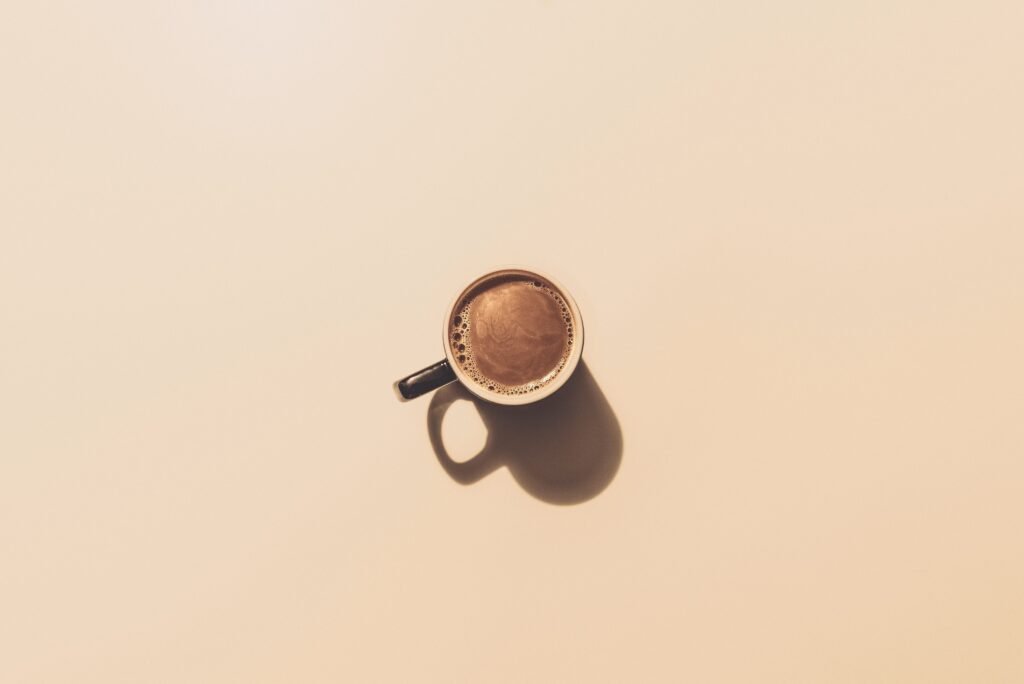This one runs deep guys. For those of you that know me, you know I love my coffee. A honey almond milk latté or cashew milk café au lait is a quick way to my heart. But, at some point, I had to face the music.
Before going on, I do want to note that coffee does have benefits. It has mood boosting impacts, a high antioxidant content that can help with various disease prevention, and a growing body of research pointing to impacts on cognitive health and stamina. But leaving it there isn’t the full picture – especially for women.
This article will explain how coffee may behind some hormone chaos, how much is really too much, and what you can drink instead.
It Interfere With Our Sleep:
Coffee is best known for giving us a boost of energy and “awakeness,” but that feeling can carry over into the night, interfering with our sleep. Coffee blocks something in our brain called adenosine receptors. Adenosine is a chemical that makes us feel sleepy – so when its uptake is blocked by caffeine, it blocks the effect of feeling tired. The issue is that caffeine may stay in our body for anywhere from 4-10 hours (!!), depending on our ability to metabolize it. It is estimated that up to 50% of the population are slow caffeine metabolizers, meaning it takes about ½ of us 8-10 hours to lower our blood caffeine levels after our cup o’ joe.
Which means we can be blocking our “sleep hormone” during the times when we need it to work most.
Let’s say we have a coffee at 1:00 pm – that means that coffee may still be working in our body at 11:00 pm that evening. While this depends a bit on how fast we metabolize caffeine, it is safe to say that for many of us, the impacts of coffee can be felt way after that last sip.
Further, once the caffeine wears off, our body then has excess adenosine that is only now just able to start binding to the receptors. Too much, and we have an overflow of adenosine – and what does that mean? Well, the extra adenosine in the morning means we feel sleepy in the morning…which means we grab a cup of coffee to stay awake…you get the picture.
Caffeine has also been shown to impact sleep onset time and reduces the time of slow-wave sleep, which is the deep, restful sleep. Since a lack of quality sleep and restfulness can impact fertility, cycle, circadian rhythm and so on, it’s best to try and limit caffeine from this perspective.
It Can Increase Stress Hormones:
You know that feeling of “alertness” we get from our morning Joe? Well, that’s caffeine spiking our cortisol, adrenaline and epinephrine, the stress hormones produced by our adrenal glands. While stress hormones play an important role in our body, when we produce too much of them, it can cause issues from inflammation to increased disease risk.
The other issue with caffeine is that many of us drink coffee first thing in the morning. Cortisol levels peak about 30 minutes after rising – it is our body’s way of making our body feel “awake” when we get out of bed. So when we throw some coffee on top, we can push our body into into overdrive, keeping our cortisol levels higher than usual for longer than usual. Overtime, if we continue with our caffeine habit, it can actually tell our body to produce less cortisol, and then our body is dependent on caffeine to feel awake.
High cortisol levels can also increase our blood sugar and cause issues with inflammation, making it particularly problematic for those with PCOS or women trying to conceive.

It Can Mess With Our Reproductive Hormones:
The research on coffee and our reproductive hormones is a bit mixed.
While some show that caffeine has no impact, there is a breadth of research that links caffeine intake to longer menstrual periods, both lower estrogen levels (and low libido, amenorrhea, etc.) and higher estrogen levels (linked to weight gain, heavy periods, fibroids, etc.) depending on the person and their ethnicity.
With this in mind, it is not surprising then that some studies have found that caffeine consumption can lead to difficulty around fertility. One study found that just 500 mg of daily caffeine consumption, the equivalent of about 2.5 cups of coffee or a little more than 1 Venti Starbucks, was linked to decreased fecundity and increased time in becoming pregnant. Another study found similar results, indicating that the caffeine and fertility connection may be a dose-dependent relationship.
However, other studies have found no or contradicting results when it come to caffeine. This study found that heavy caffeine consumption (>700 mg) was associated with decreased fertility, and yet moderate caffeine consumption (around 300 mg) was linked to an increase fertility. While the jury is still out on what the sweet spot is with caffeine, it may be better to limit consumption if you are trying to conceive.
Moreover, when it comes to PMS symptoms and cramps, coffee may be a common culprit. Caffeine is a vasoconstrictor, meaning it makes our blood vessels smaller and decreases blood flow. This can potentially make cramping and muscle soreness worse.
The takeaway? While results are still conflicting (as with most things), generally speaking, there is an overarching trend that caffeine impacts our hormonal cycles and fertility.
It Can Cause Micronutrient Depletion:
Coffee can deplete our body of important micronutrients, many of which are vital for the natural ebbs and flows of our reproductive hormones, ovulation and fertility.
Coffee can deplete us of magnesium, which is needed to help with menstrual cramps, bowel movements, and other bodily functions. It also lowers our body’s reserves of B vitamins (needed for ovulation) and calcium (think bone health). Research has shown caffeine can actually block calcium absorption, meaning you’re liking not getting much calcium support from the milk you’re adding into your coffee.
Not only that, but caffeine can block up to 80% of our iron absorption. Which especially during our period, can lead to more fatigue and increased risk of iron-deficiency anemia.
So How Much Caffeine Is Okay?
It is still unclear what the “right” or “perfect” amount of caffeine would be. And really, it depends on the person, their overall diet, and their stage of life. However, most research points to having no more than 200-300 mg of caffeine daily, or about 2-3 cups of coffee. Other research is a bit more conservative, saying that even 100 mg can have consequences.
My take? Limit it as much as you can. If you find that you simply *need* that morning cup of coffee, try to enjoy it with food around 1-2 hours after rising, and stop after 1 cup.
Where Can I Find Caffeine?
Significant contributors of caffeine are only from a few food sources. Here’s a quick reference guide with serving sizes and caffeine content estimates:
- 12 oz red bull: 111 mg
- 1 cup of coffee: 95 mg
- 1 espresso shot: 65 mg
- 12-oz Mountain Dew: 54 mg
- 1 cup black tea: 45 mg
- 1/2 tsp matcha: 40-60 mg
- 12-oz Diet or Regular Coke or Pepsi: 38-45 mg
- 1 oz. dark chocolate: 15-22
So What Now?
What you decide to do with this information is in your hands. If you are open to reducing your caffeine intake, you may want to start by limiting your coffee intake to 1 cup daily or start to swap over to matcha, which can have a much more gentle impact on our body. Or consider other creamy, nourishing caffeine-free drinks like this turmeric latté.
Written By: Amanda Wahlstedt, RDN

share this post >>
share this post >>